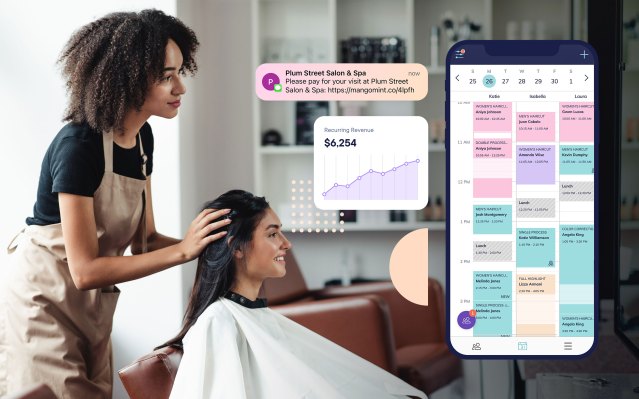Ever needed to read your credit card information on the phone to make a massage appointment? The process is annoying, and it makes you wonder how safe it is to give a stranger your personal details. That’s why Los Angeles-based Mangomint built a SaaS tool that strives to streamline the booking experience for the beauty industry, which includes everything from spas and massage parlors to piercing and tattoo studios.
Mangomint recently surpassed 200,000 monthly appointments across more than 1,000 locations in Canada and the U.S., spurred by user growth during the pandemic. Investors have taken notice and funded its $13 million Series A round, which was led by OpenView Venture Partners, the Boston-based VC firm known for backing companies propelled by “product-led growth”, and joined by startup300 as well as existing angels.
Mangomint’s growth in recent times is happening in tandem with the post-COVID labor shortage across developed economies. Businesses that require in-person worker attendance, like restaurants and beauty salons, have been struggling to retain staff, many of whom have quit to deal with COVID sickness, look for higher-paid jobs or seek better work-life balance.
“Cost [of labor] is up and supply is down because people just quit,” Mangomint’s founder and CEO Daniel Lang told TechCrunch. “We are tapping into these jobs with smart automation.”
Mangomint was born out of Lang’s cross-country road trip back in 2016 after the Austrian founder sold his software development company. “No matter what city or town we went to [in the U.S.], there were salons and spas. We ended up booking a ton of appointments, but we always had to call to book,” Lang recalled.
Lang described the current iteration of Mangomint as “an OS for salons and spas” that automates booking, point-of-sale, employee payroll and customer relationship management. The intention isn’t to remove humans, Lang said, but to augment human work — a mission that has become common for a lot of workplace automation software and a friendlier message without the threat of “robots coming for human jobs.”
“All our competitors believe online booking is the only way, but at Mangomint, you will never see the word AI,” Lang added.
That’s because robots can’t carry out certain human functions yet. For example, many customers want advice from salons on the type of service they get, so Mangomint leaves that part of the interaction on the phone. After the call, its software automatically sends a text message to the customers, who will then click on a booking link to submit their credit card information — which can be auto-filled if they have it stored on their phones.
By removing some of the most menial work, Mangomint is reducing overhead costs for businesses, Lang suggested. Many vertical SaaS providers tend to overpromise and claim to help boost revenues, “but the ugly truth is that most of [this type of software] is just tools that replace spreadsheets.”
Asked why booking for spas and salons can’t take place on an OpenTable-like, centralized platform, Lang noted that there is already “a graveyard of startups that try to be the OpenTable for the beauty industry.
“If I have a trusted salon expert, why would I go through this platform that takes a fee?” asked Lang. Mangomint tries to stay in the background instead. Users can make appointments without creating a Mangomint account. And by integrating its software into the day-to-day operation of small businesses, it aims to be “invisible” so that businesses don’t even feel its existence.
